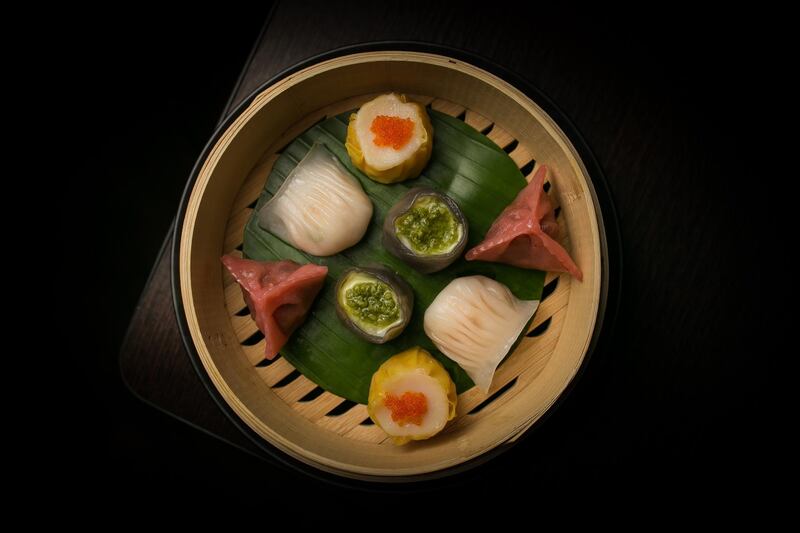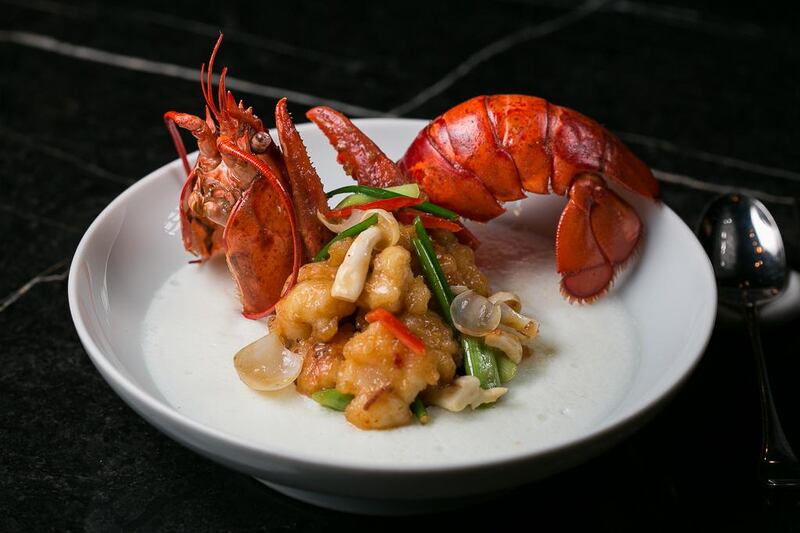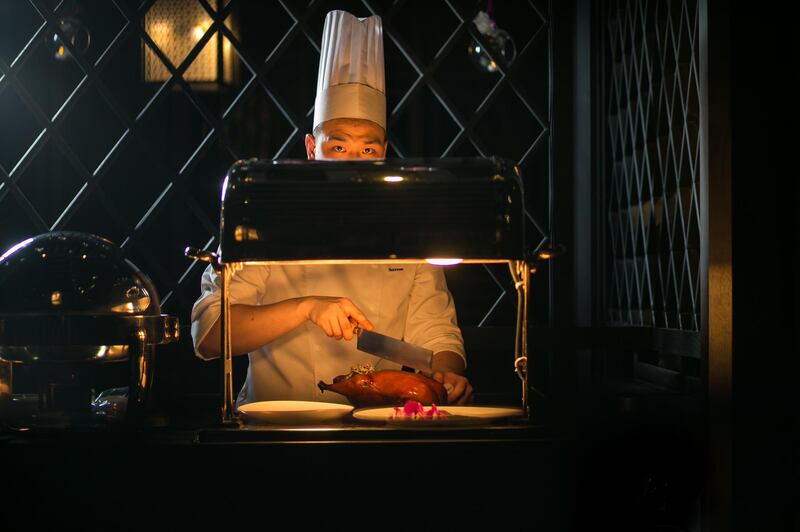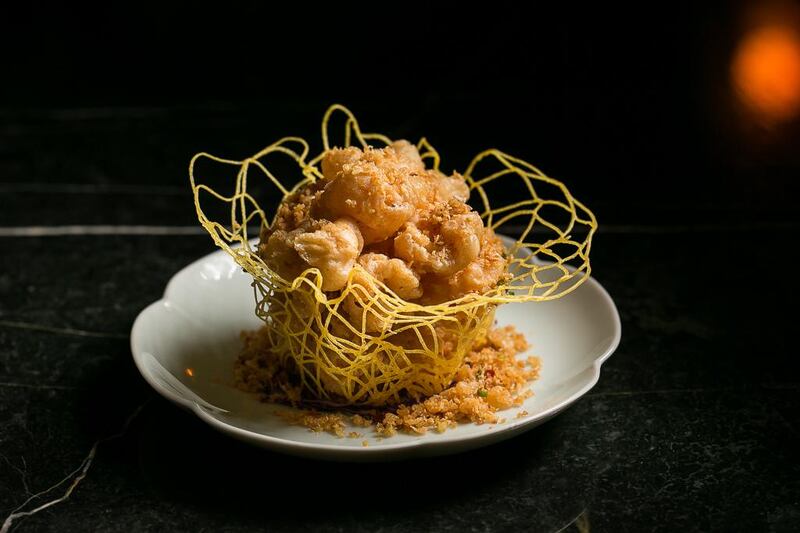It's often repeated on restaurant menus that dim sum means "touch heart" in English. Opening a bamboo lid to reveal a trio of steamed shrimp har gau or chicken siu mai, this seems apt – but it's probably a misunderstanding of two Cantonese characters that, read together, mean simply "order as you please".
This is hardly the most offensive western translation of Chinese cuisine (step forward the Pot Noodle), as dim sum has indeed touched the hearts of diners around the world since it was first served to travellers along the Silk Road trading route in the 19th century. But with the revival of the Silk Road, which was a major talking point during Chinese President Xi Jinping's state visit to the Emirates last week, there are hopes that foreigners will come to much better understand the culture and cuisine of the most populous nation in the world.
In the UAE, the process started long before Emaar announced earlier this month its plans to build a "Chinatown" in Dubai Creek Harbour. With 200,000 Chinese residents in the UAE and hundreds of thousands of Chinese visitors each year, Chinese food in particular is becoming more authentic here as entrepreneurs such as Dan Zhang, owner of Dragon Bao Bao Cafeteria in Abu Dhabi, recreate the flavours of home. "We wanted to open a Chinese restaurant so that when we eat, we will not miss China," she says, over a bowl of soup made with traditional hand-pulled noodles.
There’s just as much happening at the fine-dining end of the spectrum. Where once aficionados had to satisfy themselves with takeaway or delivery food, today they have plenty of opportunities to have the full Chinese restaurant experience, from Long Yin, with its terracotta warriors and Szechuan-style chicken, in Le Meridien Dubai, to Zheng He’s in Madinat Jumeirah, where the “duck master” elevates carving to an art form.
Is this the Hakkasan effect? Certainly it was a boost to the UAE dining scene when the trendy Cantonese restaurant opened outposts in Abu Dhabi and Dubai shortly after winning a Michelin star in London. "Hakkasan has played a major role in redefining Cantonese cuisine," says Rupesh Shetty, general manager of Hakkasan Dubai. "Our food offering is high-quality, with presentation playing a major role – every dish has to be picturesque. But what a guest takes away from Hakkasan is the entire experience, from the decor and the greeting, to the service, food and drinks."
This attention to detail has won Hakkasan Dubai a prestigious new location in the Royal Atlantis, where it is due to open next year, alongside Dinner by Heston Blumenthal. The move, which will mean the restaurant is temporarily housed at Atlantis, The Palm, while the development is completed, is a marker of the demand for high-end Chinese cooking, not just locally, but also globally. Indeed, at the start of the year many industry forecasts put Asian food as one of the biggest trends of 2018.
The fashion for sharing plates has helped, Shetty suggests. “Asian food has always been known for sharing, which is the best way of socialising over dinner, making it more fun,” he says.
It also helps that people are becoming increasingly aware of global cuisines, thanks to Instagram and the ease of travel. For William Drew, group editor of the World's 50 Best Restaurants, which started publishing its 50 Best Restaurants in Asia in 2013, a key draw for today's diners is discovering the extraordinary diversity of the Anhui, Canton, Fujian, Hunan, Jiangsu, Shandong, Sichuan and Zhejiang regions of China.
“There is no one Chinese cuisine, but a multitude of rich regional traditions, ingredients and techniques,” he says. “That said, from a broadly western perspective, Asian cuisines have until recently been defined by the modified versions created for western palates by 20th-century immigration patterns.
“Thankfully,” adds Drew, “that has begun to change as a greater opportunity to travel means that diners are becoming more open to a rich variety of culinary traditions.”
As an example of what visitors to Dubai's Chinatown can hope for, Drew mentions the San Francisco destination China Live. A marketplace for eating, drinking and shopping, it is billed as "an interactive culinary and cultural destination … offering an in-depth exploration of Greater Chinese gastronomy". It boasts an Oolong Cafe, which sells traditional teas, and a private-dining restaurant called Eight Tables, offering the experience of eating in a private home in China. With a high-end market selling everything from woks and star-fruit vinegar to black-bean soy sauce, China Live says "our mission is to demystify Chinese ingredients and recipes while educating guests on the rich history and influence".
During the Chinese President's state visit to the UAE last week – his first overseas trip since his re-election earlier this year – it became clear how close ties are becoming between the two countries. Sheikh Mohammed bin Zayed, Crown Prince of Abu Dhabi and Deputy Supreme Commander of the Armed Forces, spoke of his hopes to usher in "a new phase of co-operation" as he presented the Chinese President with the UAE's highest civil honour: the Order of Zayed. The consequences of that openness, plus Dubai's Chinatown plans and the Silk Road's revival in the form of the One Belt, One Road project, will only bring more Chinese culture into the Emirates.
And while it might take time for non-Cantonese speakers to fully appreciate the clever double entendre that led to the character meaning “touch” and the character meaning “heart” combining to spell “order as you please”, the ever-more authentic translations of Chinese dishes from dim sum to crispy duck seem guaranteed to please diners in the UAE and, yes, touch hearts.
__________________
Read more:
The third wave of Emirati coffee culture
Superstar pastry chef Cedric Grolet's Instagram has fans drooling
Unicorn craze has hit in a burst of colour at a new Dubai cafe
__________________









